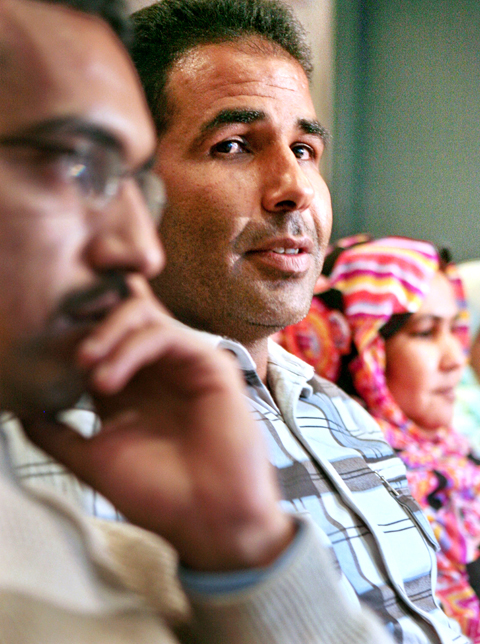One man describes a harrowing dash through a mine field, his pregnant wife in tow, as they raced to escape from the very rebels who were supposed to be protecting them.
Another talks of unmarried pregnant women and unwed mothers, including rape victims, being held in a special prison for adulterers — ostensibly to protect them from relatives bent on redeeming the family’s honor.
The stories, recounted by five Western Saharan refugees on a Moroccan-sponsored trip the US, cast a new spotlight on a largely ignored three-decade-old conflict between the rebel Polisario Front and Morocco over a mineral-rich region to which both lay claim.

PHOTO: AP
But in a war for independence that has gone largely unnoticed outside of the region, the testimonies also represent the latest salvo in a battle where propaganda increasingly plays a greater role than bullets.
“There is no future under the Polisario. There is no freedom of movement. There is no freedom of speech,” Said Abderahman said in an interview. He is one of the refugees whose trip to the US was sponsored by the lobbying group, Moroccan American Center for Policy.
“If you dare to talk they take you and put you in jail, and they bring you to a public place and they accuse you of being a thief, in front of society,” he said, speaking through a translator provided by Morocco’s UN mission in New York.
Morocco and Mauritania split Western Sahara when Spanish colonizers left the territory in 1975, but a year later they went to war over it. In 1979, Mauritania pulled out and Morocco took over the whole Western Sahara. But fighting continued between the estimated 15,000 Polisario guerrillas and Morocco’s US-equipped army, leaving thousands dead.
A UN-negotiated truce in 1991 called for a referendum on the region’s future, but that vote never happened because the two sides could not agree on voting lists. The stalemate has been monitored by UN peacekeepers.
Over the years, Morocco has pressed the UN and the world community to allow it to annex the territory, promising considerable it autonomy and a share in its mineral wealth. The autonomy offer is backed by the US and France. More than 50 countries, however, recognize the government-in-exile of the Sahrawi Arab Democratic Republic.
In March, the two sides ended a fourth round of talks under UN auspices, blaming each other for their standoff, but agreeing to consider easing restrictions against people traveling by road to visit family in the disputed territory.
Tens of thousands of residents who fled the fighting remain displaced, living in camps in Algeria.

Kehinde Sanni spends his days smoothing out dents and repainting scratched bumpers in a modest autobody shop in Lagos. He has never left Nigeria, yet he speaks glowingly of Burkina Faso military leader Ibrahim Traore. “Nigeria needs someone like Ibrahim Traore of Burkina Faso. He is doing well for his country,” Sanni said. His admiration is shaped by a steady stream of viral videos, memes and social media posts — many misleading or outright false — portraying Traore as a fearless reformer who defied Western powers and reclaimed his country’s dignity. The Burkinabe strongman swept into power following a coup in September 2022

‘FRAGMENTING’: British politics have for a long time been dominated by the Labor Party and the Tories, but polls suggest that Reform now poses a significant challenge Hard-right upstarts Reform UK snatched a parliamentary seat from British Prime Minister Keir Starmer’s Labor Party yesterday in local elections that dealt a blow to the UK’s two establishment parties. Reform, led by anti-immigrant firebrand Nigel Farage, won the by-election in Runcorn and Helsby in northwest England by just six votes, as it picked up gains in other localities, including one mayoralty. The group’s strong showing continues momentum it built up at last year’s general election and appears to confirm a trend that the UK is entering an era of multi-party politics. “For the movement, for the party it’s a very, very big

ENTERTAINMENT: Rio officials have a history of organizing massive concerts on Copacabana Beach, with Madonna’s show drawing about 1.6 million fans last year Lady Gaga on Saturday night gave a free concert in front of 2 million fans who poured onto Copacabana Beach in Rio de Janeiro for the biggest show of her career. “Tonight, we’re making history... Thank you for making history with me,” Lady Gaga told a screaming crowd. The Mother Monster, as she is known, started the show at about 10:10pm local time with her 2011 song Bloody Mary. Cries of joy rose from the tightly packed fans who sang and danced shoulder-to-shoulder on the vast stretch of sand. Concert organizers said 2.1 million people attended the show. Lady Gaga

SUPPORT: The Australian prime minister promised to back Kyiv against Russia’s invasion, saying: ‘That’s my government’s position. It was yesterday. It still is’ Left-leaning Australian Prime Minister Anthony Albanese yesterday basked in his landslide election win, promising a “disciplined, orderly” government to confront cost-of-living pain and tariff turmoil. People clapped as the 62-year-old and his fiancee, Jodie Haydon, who visited his old inner Sydney haunt, Cafe Italia, surrounded by a crowd of jostling photographers and journalists. Albanese’s Labor Party is on course to win at least 83 seats in the 150-member parliament, partial results showed. Opposition leader Peter Dutton’s conservative Liberal-National coalition had just 38 seats, and other parties 12. Another 17 seats were still in doubt. “We will be a disciplined, orderly